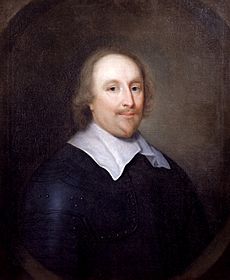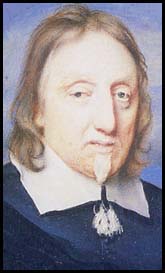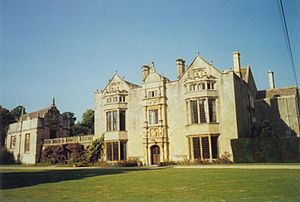William Lenthall facts for kids
Quick facts for kids
William Lenthall
|
|
|---|---|
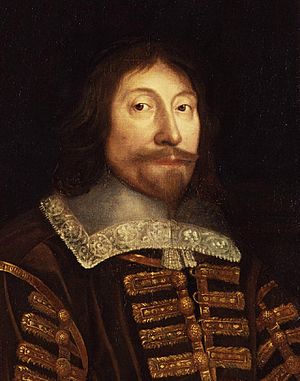 |
|
| Speaker of the House of Commons | |
| In office 26 December 1659 – 16 March 1660 |
|
| Monarch | (Interregnum) |
| Preceded by | William Say (temporary) |
| Succeeded by | Sir Harbottle Grimston |
| In office 7 May 1659 – 13 October 1659 |
|
| Monarch | (Interregnum) |
| Preceded by | Thomas Bampfylde |
| Succeeded by | William Say (temporary during Lenthall's illness) |
| In office 4 September 1654 – 22 January 1655 |
|
| Monarch | (Interregnum) |
| Preceded by | The Rev. Francis Rous |
| Succeeded by | Sir Thomas Widdrington |
| In office 6 August 1647 – 20 April 1653 |
|
| Monarch | Charles I / (Interregnum) |
| Preceded by | Henry Pelham (temporary) |
| Succeeded by | The Rev. Francis Francis Rous |
| In office 3 November 1640 – 30 July 1647 |
|
| Monarch | Charles I |
| Preceded by | Sir John Glanville |
| Succeeded by | Henry Pelham (temporary, during Lenthall's abandonment of the Speakership) |
| Master of the Rolls | |
| In office 1643–1660 |
|
| Monarch | Charles I / (Interregnum) |
| Commissioner of the Great Seal | |
| In office 1646–1648 |
|
| Monarch | Charles I |
| Chancellor of the Duchy of Lancaster | |
| In office 1645–1648 |
|
| Monarch | Charles I |
| Personal details | |
| Born | 1591 Henley on Thames, Oxfordshire |
| Died | 3 September 1662 |
| Spouses | Elizabeth Evans, by 1619 |
| Children | at least 2 sons and 2 daughters |
| Education | St Alban Hall University of Oxford, Lincoln's Inn |
William Lenthall (1591–1662) was an English politician during the time of the English Civil War. He served as the Speaker of the House of Commons for almost twenty years. This was both before and after King Charles I was executed.
He is best known for bravely standing up to the king on January 4, 1642. King Charles entered the House of Commons chamber with 400 armed men. He wanted to arrest five members he accused of treason (betraying the country). When Charles asked Lenthall where the five members were, Lenthall famously said: "I have neither eyes to see nor tongue to speak in this place but as this House is pleased to direct me." This was the first time a Speaker in English history showed loyalty to the freedom of Parliament instead of just doing what the king wanted.
Contents
William Lenthall: A Key Figure
Early Life and Education
William Lenthall was born in Henley-on-Thames, Oxfordshire, in 1591. He was the second son of William Lenthall and Frances Southwell. His family had moved to Oxfordshire in the 1400s. For a while, his family secretly followed the Catholic faith under Queen Elizabeth I. However, after his father died young in 1596, his family became Protestant. His mother, Frances, was the sister of a famous Jesuit priest and poet, Robert Southwell.
Lenthall went to Lord Williams's School in Thame. He started at St Alban Hall, Oxford in 1607 but left in 1609 without finishing his degree. He then studied law at Lincoln's Inn and became a lawyer in 1616. He built a very successful legal career. He became a judge in Woodstock in 1621 and a local official in Oxfordshire in 1631. In 1638, he became a judge in Gloucester.
Starting in Parliament
Lenthall's career in Parliament began in 1624. He was elected as a member for New Woodstock in Oxfordshire. He did not get re-elected in 1625. However, he represented the area again during the 1640 Short Parliament. During this time, he often led important discussions in the House. These discussions included topics like "ship money" (a tax) and complaints against the king. The Short Parliament lasted only three weeks and ended on May 5, 1640.
The Long Parliament Begins
King Charles I called Parliament together again on November 4, 1640. This new Parliament became known as the Long Parliament. Lenthall was again a member for New Woodstock. The king had hoped another lawyer, Sir Thomas Gardiner, would be chosen as Speaker. But when Gardiner was not elected, the king looked at other lawyers and approved Lenthall for the job. Lenthall would hold this important position for most of the next twenty years.
From the very beginning, Lenthall had people who criticized him. Some said he let too many people speak during debates. Others accused him of being unfair or making mistakes in how Parliament worked. However, records from the time suggest that Lenthall was largely in charge of Parliament's meetings in its early months.
During 1640 and 1641, Lenthall proved to be a good Speaker. He helped create or improve many rules for how Parliament should work. For example, he set rules for how long parliamentary privilege (special rights for members) lasted. He also made a rule that members could not speak when another member was already talking. He also made it a rule that only one topic could be discussed at a time.
By late 1641, Lenthall found the long meetings very tiring. He really wanted to stop being Speaker. He was also worried about his money, saying he would become poor if he continued. However, he ended up staying in the job, with only a few breaks, for many more years.
Standing Up to the King
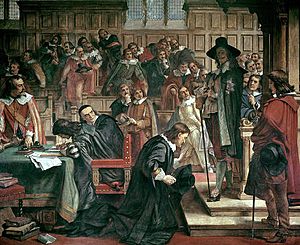
The relationship between the House of Commons and the king became very tense in 1641. At the end of that year, Charles accused five important members of the Commons of treason in the House of Lords. The Commons met on January 3, 1642, and decided that the king's accusations were a violation of their special rights. Angry, and determined to arrest the Five Members, Charles decided to go to the House of Commons himself.
The next day, January 4, he arrived in person with about 400 armed men. He entered the Commons chamber. Speaking to Lenthall, he said, "Mr Speaker, I must for a time make bold with your chair." Lenthall left his seat. Charles called out for one member, then another, but there was complete silence. He then asked the Speaker where they were. Kneeling, Lenthall replied:
May it please your majesty, I have neither eyes to see nor tongue to speak in this place but as this House is pleased to direct me whose servant I am here; and I humbly beg your majesty's pardon that I cannot give any other answer than this to what your majesty is pleased to demand of me.
This was the first time a Speaker had declared his loyalty to the freedom of Parliament rather than to the king's wishes.
The King paused. "It doesn't matter," he said, "I think my eyes are as good as another's." He looked around the benches for a while, then sadly said, "all my birds have flown." He left the chair and walked out, looking more upset and angry than when he came in. Members shouted "Privilege! Privilege!" as he left.
Charles's attempt to show his power failed. He left London less than a week later. Within months, the country was in a civil war.
Parliament recognized Lenthall's brave defense of his role on April 9, giving him £6,000. In his last speech to the king, Lenthall spoke about making peace. He asked Charles to get rid of his bad advisors.
During the Civil War
Parliament continued to meet during the English Civil War. It now acted without the king's permission. Lenthall remained Speaker. He supported Parliament's side but did not agree with those who wanted extreme religious changes. In November 1642, he strongly argued that the Commons should offer peace to the king.
During this time, Lenthall was given several important jobs. This helped ease his worries about money. He had already complained about his low salary and received £6,000. In the 1640s, he became Master of the Rolls (a senior judge). He also became a commissioner of the Great Seal and Chancellor of the Duchy of Lancaster. However, his money worries continued. His lands near Oxford were at risk of being taken by the royalists during the war.
Parliament Under Pressure
By 1647, people were becoming unhappy with the power of the New Model Army. They also disliked the unfair actions of local committees. The Long Parliament became very unpopular. It had put in place high taxes and chosen a path that led to much fighting without clear success. On July 26, a crowd forced its way into Parliament. They wanted Parliament to agree to the army's demands. The Speaker was held in his chair by force and made to vote on a resolution inviting the king to London.
On July 31, 1647, Lenthall announced that the votes in the Commons had been forced, making them invalid. He said he would go to the army and only return when he was free to do his job. He left London with 57 other members, eight lords, and the Speaker of the Lords. The soldiers welcomed the members. Their commander, Lord Fairfax, invited them to see 15,000 soldiers on Hounslow Heath on August 3. Fairfax's soldiers surrounded London the next day. Under their protection, Lenthall and the others were brought back to Parliament in triumph. Lenthall was put back in his chair, and all votes made during his absence were cancelled.
Lenthall agreed with the Independents in Parliament. Royalist newspapers in 1648 said he was their puppet, trying to control the House for their benefit. But he did not always act as expected. For example, he used his deciding vote to continue talks with the king.
The Army Takes Control
On December 6, 1648, an event known as Pride's Purge happened. Soldiers from the New Model Army, led by Colonel Thomas Pride, forcibly removed all members from Parliament who were not Independents or army supporters. Lenthall remained silent, likely having been warned beforehand. He was definitely consulted by Independent leaders during this crisis in December.
After the King's Execution
The Purge reduced the Commons to a small group of just over 200 hard-line members, known as the Rump Parliament. Lenthall remained Speaker during the discussions and decisions that led to Charles I's execution on January 30, 1649. However, there is no proof that he was actively involved in the events leading up to the king's death. Later, he claimed to have sent money to the king in Oxford. He also said he helped care for the queen and the royal children. He also used his influence to help some royalists when he felt it was safe. He sometimes used his deciding vote to save lives.
In February 1649, the House voted to get rid of both the House of Peers and the monarchy. Lenthall found himself Speaker of a new, single-chamber Parliament. Although he had little real power, Lenthall became the most important citizen in England as its representative. He was the first to promise loyalty to the new Commonwealth. However, he remained careful and traditional in his approach to public matters.
In December 1651, Oliver Cromwell arranged a meeting at the Speaker's house. They discussed ideas for the future government. Lenthall, along with the other lawyers present, argued against a pure republic. They supported a government that included some role for a monarch.
Cromwell's Rule
The Rump Parliament had promised to dissolve itself "as soon as possible" for the safety of the people. But it did not do so. On April 20, 1653, Cromwell and other army officers forcibly dissolved it. Supported by Colonel Thomas Harrison and 30 or 40 soldiers, Cromwell ordered the chamber to be cleared. Lenthall again stood firm, telling Harrison he would not leave unless he was pulled out. Harrison reached out an arm, and Lenthall gave in. He likely knew that resisting was pointless.
Lenthall had become linked with the problems of the Rump Parliament. He did not have a place in the Nominated Assembly, which met from July to December 1653.
The First Protectorate Parliament was called in 1654 by Cromwell, who was now Lord Protector. Lenthall was elected as a member for Oxfordshire. On September 4, he was again confirmed as Speaker.
In the Second Protectorate Parliament, called by Cromwell on September 17, 1656, Lenthall was again a member for Oxfordshire. But this time, he was not chosen as Speaker. He still took a full part in the meetings. He was the senior member on the committee that set up the new government rules. He supported Cromwell and was rewarded with a seat in Cromwell's new Other House. He became Lord Lenthall on December 10, 1657.
Parliament Returns
After Oliver Cromwell died on September 3, 1658, his son Richard Cromwell became Lord Protector. But the Protectorate quickly fell apart. On May 6, 1659, senior army officers visited Lenthall. They asked him to help bring back the Rump Parliament and return as Speaker. Lenthall did not want to give up his seat in the Other House and said he was ill. But when Parliament was called without his help, he felt he had to return as Speaker the next day.
Lenthall now led a Parliament with only 78 members. Despite his role as head of the army, the division between Parliament and the army grew. On October 12, 1659, the army surrounded and took over the Parliament buildings. For a day and a night, there was a stand-off with Parliament's defenders. Lenthall himself was stopped by the soldiers and had to turn back. When he protested that he was their general, the soldiers replied that they would have known him as such if he had marched before them on Winnington Bridge.
However, the army leaders were unsure if their latest action was meant to completely get rid of the Rump Parliament or just force it to agree to terms. Lenthall began to move away from the republicans. In November, he was reported to be in contact with General George Monck. Monck was actively working against the army groups that opposed the Rump. The situation completely changed by December 24. Lenthall was approached at home and asked for his permission, as head of the army, for troops to parade. Soldiers who had earlier refused to recognize Lenthall's authority now marched to his house to cheer him with shouts and gunshots.
He arranged a meeting of the restored Rump on December 26, 1659, with only 42 members present. But then he stayed away from the House for ten days, saying he had gout. This was probably to avoid taking an oath against the House of Stuart, which the republicans in Parliament wanted. By February 1660, Lenthall was fully working with Monck and had completely broken with the republicans.
On March 16, 1660, the Rump Parliament voted to dissolve itself. This ended Lenthall's long time as Speaker. It also cleared the way for Monck to organize new elections for the Convention Parliament. Lenthall helped bring about the return of the monarchy with his advice and service. However, he found himself out of favor. Monck tried to get Lenthall elected for Oxford University, but it did not happen.
The King Returns to Power
The new parliament met for the first time on April 25, 1660. On May 8, it announced that King Charles II had been the rightful monarch since Charles I was executed on January 30, 1649. Lenthall sent £3,000 to the new king. He hoped to keep his job as Master of the Rolls, but he was told it had been given to someone else.
Lenthall was at risk of being put on trial for some of his actions during the time without a king. He was strongly criticized by William Prynne. In the end, however, he was simply banned from holding any public office for life by the Act of Indemnity and Oblivion 1660. The act specifically named him as someone who could not accept public office again.
On October 12, 1660, he gave evidence at the trial of Thomas Scot, who was involved in the king's execution. Lenthall swore that Scot had spoken in Parliament in favor of executing the king. Many people were disgusted by this, given Lenthall's famous defense of Parliament's rights in 1642.
Later Life and Legacy
Lenthall retired to Burford, Oxfordshire. He died there on September 3, 1662, and was buried in the church. On his deathbed, he confessed: "I confess with Saul, I held their clothes whilst they murdered him, but herein I was not so criminal as Saul was, for God, thou knowest, I never consented to his death." He asked that his only epitaph (words on his tombstone) be Vermis sum ('I am a worm'). His only surviving son was the politician John Lenthall (1624 or 1625 – 1681).
His Homes and Art Collection
By 1619, Lenthall had married Elizabeth Evans (who died in April 1662). William Lenthall had two main homes: Burford Priory in Oxfordshire (which still stands today) and Besselsleigh Manor in Berkshire. In 1637, he bought Burford from Lord Falkland. The house stayed in the Lenthall family until 1828.
Lenthall had a large collection of paintings. Some were family portraits, and some might have been at Burford when he bought it. He may also have bought paintings from the Royal collection after Charles I was executed. The family sold the collection in 1833.
What People Thought of Him
Throughout his life, people had different opinions about Lenthall. Early in his career, opponents often criticized him for being weak as Speaker. However, historians say these criticisms are not always fair. His actions during that time show he wanted to keep his position and help Parliament work better.
On the other hand, he was very traditional and did not have a strong political vision. People often accused him of being greedy and corrupt. While it was hard to prove these claims, and many came from people who had reasons to complain, the accusations of greed and dishonest behavior happened too often to be ignored.
However, his brave defiance of Charles I in January 1642 was a key moment. This act alone guaranteed his lasting fame.
Images for kids
 | Isaac Myers |
 | D. Hamilton Jackson |
 | A. Philip Randolph |


